|
October 2009 Updates
Exploring the identity of Melchizedek

[ Disclaimer: The following entry - related to this week's Torah reading (Lekh Lekha) - attempts to explain the traditional Jewish view of the identity of Malki-Tzedek (i.e., "Melchizedek"). Please note that this is simply an "exploratory discussion" that I hope will prompt you to think through some of the questions for yourself... ]
10.30.09 (Cheshvan 12, 5770) After Abram was given the divine promise to inherit the land of Canaan (Gen. 13:14-18), the Torah gives an account of a regional war (near the Dead Sea) during which his nephew Lot was taken prisoner. When Abram learned of his nephew's abduction, he mobilized a small army of men and rescued him, supernaturally defeating King Chedorlaomer and his three vassal allies (Gen. 14:1-16). To honor his victory, the king of Sodom met Abram at the Valley of Shaveh (i.e., the "United Valley" just outside Jerusalem) and escorted him to the city of Salem (later renamed "Jerusalem"). It was here, at Salem, that "Malki-Tzedek" (מַלְכִּי־צֶדֶק), the high priest and king of the city, brought out bread and wine and blessed Abram (Gen. 14:18).
But who is this mysterious figure called Malki-Tzedek? The name "Malki-Tzedek" literally means "my king" (i.e., מַלְכִּי, from מֶלֶךְ, "king") is "tzedek" (i.e., צֶדֶק, "just, righteous"). Note that it does not mean "King of righteousness" (as is sometimes claimed by Christian theologians), since the word "malki" contains a possessive personal pronoun (i.e., "my king"). Jewish tradition identifies Malki-Tzedek as Shem (שֵׁם), the firstborn son of Noach, who settled in Salem (שָׁלֵם) some time after the great Flood. To understand how Shem became the first high priest and king of Zion, we need to go back and reconsider the lineage of the patriarchs.
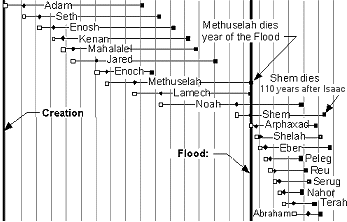
Adam was the world's "firstborn son" (bechor) of God (Gen. 2:7, Luke 3:38). After his transgression (and expulsion from the garden), Adam built an altar and offered sacrifices to the LORD as humanity's first high priest. When he later died, Adam's son Seth (שֵׁת) became high priest in his place. When Seth later died, the priesthood went to Methuselah (מְתוּשָׁלַח) who served for centuries. Methuselah was prophesied to die seven days before the advent of the great Flood, and upon his death his grandson Noach (נחַ) was commissioned to be humanity's high priest. Noach had learned the laws of sacrifice ("clean" and "unclean") from the books of Adam and Enoch as well as from his grandfather (Gen. 8:20). After the Flood, Noach rebuilt Adam's original altar in Jerusalem (which had been destroyed earlier by wicked people of the generation of the Flood). Later, however, he was disqualified to be priest and his firstborn son Shem (שֵׁם) took his place. Shem remained in Jerusalem (i.e., Salem) and became its king and high priest. The name "Malki-Tzedek" was later ascribed to him as an honorary title (perhaps similar to the title Adonai-Tzedek as mentioned in Joshua 10:1).
Now Shem was truly an extraordinary person. He was the firstborn son of Noach who personally served the great patriarch Methuselah for 98 years before the Flood (Methuselah, it should be noted, directly knew Adam). And Shem had witnessed -- firsthand -- the devastation of the Flood and God's judgment upon the world. After the deluge, he settled in Salem where he founded a school for Torah study to encourage his descendants to serve the LORD. According to tradition, Shem was present at the brit milah (circumcision) of Abraham and Ishmael (Gen. 17:23), and later Isaac studied with him after the Akedah ordeal (Gen. 22:1-14). Still later, Isaac's wife Rebecca went to visit him regarding the struggle of her pregnancy and was given the prophecy of the "elder serving the younger" (Gen. 25:22-23). And when Jacob finally "stole" the blessing from Esau, he fled from his brother by going first to Shem's school in Salem. So all three of the avot (patriarchs) of Israel -- Abraham, Isaac, and Jacob -- personally knew Shem.
Shem is considered one of the four righteous men of the "dispersion" period (i.e., the period after the Flood in which the descendants of Noah were to commanded to settle the earth). The thee others are Noach, Eber, and Abram. For 400 years Shem preached to the idolaters of the world, calling them to repentance and offering instruction at his school in Salem. He was a prophet who foresaw the future glory of Zion -- God's Temple and the redemption of the human race. He wanted to establish the kingdom of God based on justice (tzedek) and peace (shalom).
According to the sages of the Talmud, God originally planned to bring forth the priesthood through Shem, but he was disqualified because he had blessed Abram before God ("blessed be Abram ... and blessed be the Most High God," see Gen. 14:19-20). Because of this misstep, the LORD decided to bring the priesthood through Abraham's offspring (i.e., Levi). Indeed, the sages interpret David's later statement, "You are a priest forever after the order of Melchizedek" (Psalm 110:4) as, "You are a priest forever because of the words (al-divrati / עַל־דִּבְרָתִי) of Malki-Tzedek" (Bava Batra 14b). Shem had got his priorities mixed up and put Abram before the LORD, and that displeased God. Moreover, the sages note that Shem understood God primarily as El Elyon (אֵל עֶלְיוֹן), the supreme God among other gods (elim), but Abram put the LORD first ("I have lifted my hand to the LORD, God Most High..." Gen. 14:22). In other words, Shem's idea of God was of a Supreme Being, Creator, and Judge, but Abram understood God as the personal LORD (יהוה), the compassionate Source of life. Abram understood the LORD as the God of human providence and care, not just as the Judge of the earth.
As already mentioned, Abram and Shem knew each other, though after the "war of the kings," they were said to be fearful of one another. Abram was said to be fearful that Shem would resent him for killing his descendants (Chedorlaomer was a direct descendant of Shem), whereas Shem was fearful that Abram was angry over the abduction of Lot and the need for war. The offering of bread and wine therefore represented a "peace offering" between the two. Moreover, Shem was further revealing to Abram the laws of the high priesthood. The bread represented the "bread of faces" (לֶחֶם פָּנִים) or "showbread," and the wine represented libations or drink offerings (נֶסֶךְ), both of which became part of later Temple worship. Abram's victory was sanctified by the high priest of God, and Abram's tribute was given to honor God's representative.
Malki-Tzedek may have been the historical Shem, though מַעֲשֵׂה אֲבוֹת סִימָן לַבָּנִים / ma'aseh avot siman labanim: "The deeds of the fathers are signs for the children." In other words, like other "types" or patterns given in Scripture (e.g., the sacrifice of Isaac), there is a deeper significance to the immediate historical context. The fusion of a King-Priest that predates Israel is a picture of the Messiah himself, as was foreseen by the prophets.
For example, the name Adonai Tzidkenu (יְהוָה צִדְקֵנוּ), "the LORD our Righteousness," appears in Jeremiah's prophecy of the "righteous branch" (tzemach tzaddik, צֶמַח צַדִּיק), the great Davidic King who was promised to appear (Jer. 23:5-6). This "Righteous Branch" is also mentioned in Book of Zechariah as the one who would ultimately unite the authority of the priesthood with the Kingship of God on behalf of Israel's redemption.
Although Jewish tradition regards Malki-Tzedek to be the patriarch Shem, he is clearly a picture of Adonai Tzidkenu. He is called the "King of Righteousness and priest of the Most High God" (Gen. 14:18-20; Psalm 110:4; Heb. 5:6). The Midrash Lamentations says, "The proper name of Messiah is Adonai Tzidkenu - the Lord our righteousness." Note that the very first occurrence of the word "priest" in the Scriptures occurs in reference to the King/Priest Malki-Tzedek – a picture of the coming Tzemach Tzedakah, Yeshua the Anointed One.
The New Testament calls Yeshua Adonai Tzidkenu and declares Him the only True Tzaddik (1 Cor. 1:30; 1 John 2:1) since He alone truly fulfilled the Torah of Moses and gave Himself as a sacrificial offering upon the cross to save the world from the judgment of God (2 Cor. 5:21; John 3:36). Those who trust in Him are also justified as tzaddikim, since "the tzaddik shall live by faith" (Hab. 2:4, Rom. 1:17, Gal. 3:11).
In short, Adonai Tzidkenu is the name for Yeshua who "saves His people from their sins" (Matt. 1:21). The righteousness of Yeshua is the gospel message itself, that is, the power of God to save us from the verdict of our sinful condition and to restore our relationship with a holy and morally perfect God. God will not clear the guilty, but He does something infinitely better: He removes the guilt! The curse of the Law's verdict upon us has been taken away through the substitionary sacrifice of Yeshua upon the cross at Moriah (Gal. 3:13; 2 Cor. 5:21). God puts our sin upon Yeshua and gives us His righteousness in exchange. By sincerely turning to Him in confession of our condition and trusting in His righteousness we are declared legally "justified" (i.e., "just-if-I'd" never sinned) before the Judge of the World. Moreover, through our union with Yeshua, we share in the vindication of His resurrected life and have peace with God (Rom. 5:1). To be justified is to share in Yeshua's righteousness: Adonai Tzidkenu!
Of course the Book of Hebrews also links the priestly work of Yeshua as our Kohen Gadol of the New Covenant with Malki-Tzedek (Heb. 5-10). Malki-Tzedek is said to have been "made like" (ἀφομοιόω) the Son of God, "having neither beginning of days nor end of life" (Heb. 7:3). This Greek word means "to resemble" or "to liken" (from ἀπό + ὁμοιόω). The priesthood of Yeshua is said to be after the "order of Malki-Tzedek," based on a direct oath from God, that predates the operation of the Levitical priesthood (for more information about the role of Yeshua as our High Priest, see the article "Yom Kippur and the Gospel"). This is not unlike the King/Priest office that Moses held when he commanded the sacrifice of the Passover lambs during the Exodus. The korban pesach (sacrifice of Passover) was not originally instituted through the Levitical priesthood (i.e., the Mishkan), but rather predated the giving of the law to the priests.
Yeshua is Adam ha-Sheni - the "Second Adam" - who offered up a better sacrifice upon the altar of the Cross in Jerusalem (1 Cor. 15:45). He is humanity's great High Priest (Kohen Gadol) of the New Covenant with God. Like Malki-Tzedek, Yeshua's priesthood abides forever and is more profound than that given through the Levitical rites. Yeshua "ever lives to make intercession for those who put their trust in Him as their advocate before Heaven" (Heb. 7:25).
Note: Some Christians regard Malki-Tzedek as a preincarnate manifestation of Yeshua, though the Book of Hebrews says that Yeshua is "in the similitude" (ὁμοιότης) of Malki-Tzedek, not that He is Malki-Tzedek. Moreover, Malki-Tzedek is said to have been "made like" (ἀφομοιόω) the Son of God, "having neither beginning of days nor end of life" (Heb. 7:3), but again it does not explicitly say He is the same person.... It's entirely possible that Malki-Tzedek was both a historical person and a picture or "parable" of Yeshua as the great High Priest and King. Yeshua came after "the order (τάξιν) of Malki-Tzedek" (Heb. 6:20), a term that refers to an office or position as the true King and High Priest of God (this is expressed in Psalm 110:4 as עַל־דִּבְרָתִי / al-divrati, "according to the word or manner" of Malki-Tzedek).
Addendum: This entry was meant to help you better understand traditional Jewish view about Malki-Tzedek. Unfortunately, it does not go into a detailed look at the Book of Hebrews discussion regarding this subject (please forgive any oversight on my part, chaverim). If it pleases God, I will write more about Malki-Tzedek at a later time.
 |
Abram the Hebrew - אַבְרָם הָעִבְרִי

[ The following entry is related to this week's Torah reading (Lekh Lekha). Please first read the Torah portion to "find your place" here. ]
10.29.09 (Cheshvan 11, 5770) In this Torah portion Abram is called ha-ivri (הָעִבְרִי) - "the Hebrew," a term that means "one who has crossed over" (עָבַר) from another place. Rashi identifies this "other place" as Ur Kasdim (אוּר כַּשְׂדִים), located east of the Euphrates River, though the midrash (Genesis Rabbah) symbolically identifies it as the realm of idolatry: "The whole world stood on one side, but Abram crossed over to the other." Abram separated himself from a world steeped in idolatry and polytheism by worshipping One God who is the sole Creator of all things.... Understood in this way, being "Hebrew" means being regarded as an "other," a "stranger," or an "outsider" to idolatrous world culture.
Various midrashim tell the story about how Abram came to understand the truth that there is only one God who is Creator of all. For instance, when he was born, Abram's mother hid him in a cave. She was afraid that the evil king Nimrod would kill her son because prophets had warned that he would triumph over Nimrod. Guarded by the angel Gabriel, young Abram first worshipped the stars as gods until they were obscured by the Sun. The he declared that the Sun was god until it set and the Moon took its place. Clouds then covered the Moon, showing Abram that the Moon was not a god either. At last, Abram understood that there was one supreme God would ruled over all the forces of the universe. (Later, after the danger had passed, young Abram rejoined his family.)
A midrash relates that Abram's father Terach sold idols for a living in the city of Haran. But Abram had long since realized that idol worship was foolishness. One day when he was asked to watch his father's store, Abram took a hammer and smashed all the idols - except for the largest one. His father came home and demanded to know what happened. Abram explained that the idols all got into a fight and the biggest idol won. When his father objected that this was impossible, Abram said, "Aha! So you agree with me that idols are powerless! My father, there is only one true God, and this God cannot be shaped with human hands..." Terach was angry but understood that his son had discovered the great truth of ethical monotheism.
Lekh lekha (לך־לך) literally means "go for yourself." Rashi states that it means "Go for your own benefit," though the Chassidic teachers interpret it as "Go to yourself" (i.e., begin your own journey back to God). At any rate, it's clear that the phrase is an invitation by God to venture ahead -- to go forth in faith... Go forth and risk everything for the sake of God's promise.
"Go forth ... to a land that I will show you" (Gen. 12:1). Note that the LORD spoke to Abram and invited him to forsake his ancestral homeland for the promise of God. But note further that it was only after Abram made the long journey to the unknown land of Canaan that God appeared to him to him by the oaks of Mamre saying, "To your offspring I will give this land" (Gen. 18:1). Abram did not believe the promise because he saw God; he was only able to see God after he had walked in faith. First Abram heard the message, and later -- after he acted on his faith -- was he enabled to see more... מַעֲשֵׂה אֲבוֹת סִימָן לַבָּנִים / ma'aseh avot siman labanim: "The deeds of the fathers are signs for the children."
 |
New Hebrew Meditation
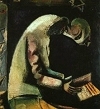
10.27.09 (Cheshvan 9, 5770) I wrote another brief Hebrew meditation (The Discipline of Suffering) based on Psalm 119:71: "It is good for me that I was afflicted, so that I may learn Your statutes." I hope you will find it helpful, friends...
Personal Update:
On a personal level, my wife has been quite sick and we've been stressed to the limit (for a variety of reasons), but God is faithful.... Both our sons are doing well, B"H. Here are a couple pictures I took of them a couple days ago:
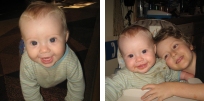
Judah and Josiah - October 2009
Despite being without a job, the LORD has been compassionate and gracious to our family. Thank you so much for standing with this ministry! We are only able to serve in this way because of the kindness and love of God's people. Shalom, chaverim.
El Shaddai... אֵל שַׁדַּי

[ The following entry is related to this week's Torah reading (Lekh Lekha). Please first read the Torah portion to "find your place" here. ]
10.25.09 (Cheshvan 6, 5770) In this week's Torah (Lekh Lekha), the LORD described Himself using the Divine Name El Shaddai (אֵל שַׁדַּי), often translated as "God Almighty." In Genesis 17:1, YHVH said to Abram: "I am El Shaddai. Walk before me and be perfect." But why did the LORD choose to reveal Himself using this distinctive Name to Abram?
Most English translations render El Shaddai as "God Almighty," probably because the translators of the Septuagint (i.e., the ancient Greek translation of the Old Testament) thought Shaddai came from a root verb (shadad) that means "to overpower" or "to destroy." The Latin Vulgate likewise translated Shaddai as "Omnipotens" (from which we get our English word omnipotent). God is so overpowering that He is considered "Almighty."
According to some of the Jewish sages, however, Shaddai is a contraction of the phrase, "I said to the world, dai (enough)" (as in the famous word used in the Passover Haggadah, Dayeinu -- "it would have been sufficient"). God created the world but "stopped" at a certain point. He left creation "unfinished" because He wanted us to complete the job by means of exercising chesed (love) in repair of the world (tikkun olam).
Jacob's blessing given in Genesis 49:25, however, indicates that Shaddai might be related to the word for breasts (shadaim), indicating sufficiency and nourishment (i.e., "blessings of the breasts and of the womb" (בִּרְכת שָׁדַיִם וָרָחַם)). In this case, the Name might derive from the contraction of sha ("who") and dai ("enough") to indicate God's complete sufficiency to nurture the fledgling nation into fruitfulness. Indeed, God first uses this Name when He refers to multiplying Abraham's offspring (Gen. 17:2).

In short, the name El Shaddai provides a picture of God's nurturing love for our lives... God sustains us and loves us, like a mother loves her newborn child...
El Shaddai is used almost exclusively in reference to the three great patriarchs: Abraham, Isaac, and Jacob, and (according to Exodus 6:2-3) was the primary name by which God was known to the founders of Israel (the Name YHVH given to Moses suggests God's absolute self-sufficiency). The word "Shaddai" (by itself) was used later by the prophets (e.g., Num. 24:4; Isa. 13:6, Ezek. 1:24) as well as in the books of Job, Ruth, and in the Psalms. In modern Judaism, Shaddai is also thought to be an acronym for the phrase Shomer daltot Yisrael - "Guardian of the doors of Israel" - abbreviated as the letter Shin on most mezuzot:
Note: If it pleases God, I will add additional commentary to this Torah portion later this week, chaverim.
Parashat Lekh Lekha - לך־לך

10.25.09 (Cheshvan 6, 5770) The Torah reading for this week (Lekh Lekha) introduces us to Avraham Avinu, "our father Abraham," and the crucial concept of being "justified by faith" before the LORD...
Some Christians might be surprised to learn that the idea of "justification by faith" is not unfamiliar to Jewish theology (and certainly was not first proclaimed through Martin Luther or any of the other "Reformers"). For example, the Talmud (Makkot 23b-24a) says, "Moses gave Israel 613 commandments, David reduced them to eleven (Psalm 15), Isaiah to six (Isaiah 33:15-16), Micah to three (Micah 6:8), Isaiah reduced them again to two (Isaiah 56:1); but it was Habakkuk who gave the one essential commandment: v'tzaddik be'emunato yich'yeh, literally, "the righteous, by his faithfulness - shall live" (Hab. 2:4). In the New Testament, the apostle Paul had likewise distilled the various commandments of the Torah to this same principle of faith (see Rom. 1:17, Gal. 3:11, and Heb. 10:38).
Note: If it pleases God, I will add additional commentary to this Torah portion later this week, chaverim.
 |
Prayer Request

10.24.09 (Cheshvan 5, 5770) Friends, I appeal to you for prayer. With my physical afflictions, I need additional strength to do this work... I do not have an office space and our house is very small, especially with two young children. I am constrained to work throughout the night, but I often am unable to sleep during the day. Presently I am behind schedule writing an article for ZLM, but I am exhausted. Your prayers are sincerely appreciated. Thank you.
New Priestly Blessing Reader Page
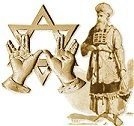
10.23.09 (Cheshvan 5, 5770) I created a new "Priestly Blessing Reader Page" for those of you who want to bless your children or friends using the prescribed words of the Torah. This page provides the Hebrew text of Numbers 6:24-6 with a translation for each word directly underneath. Brief explanatory footnotes are also provided. I hope you will find it helpful, chaverim! You can download the page here.
Note: This blessing page is intended for personal use, such as blessing your children on Friday night (before the start of the Shabbat meal) or as a bedtime blessing. It is not a description of the ritual known as Nesiat Kapayim ("the Raising of the Hands"), where the priests of Israel bless the people during synagogue services (i.e., birkat kohanim).
Noah in Jewish Tradition

[ The following entry is related to this week's Torah reading (Noach). Please first read the Torah portion to "find your place" here. ]
10.22.09 (Cheshvan 5, 5770) Despite the fact that Torah plainly describes Noach as אִישׁ צַדִּיק / ish tzaddik: "a righteous man," "blameless in his generation" (תָּמִים הָיָה בְּדרתָיו), and a man who "walked with God" (אֶת־הָאֱלהִים הִתְהַלֶּךְ־נחַ), Jewish tradition takes a somewhat ambiguous view of him, especially when he's compared to Abraham, the father of the Jewish people... In the Midrash Tanchuma (מדרש תנחומא), for example, it is said that Noach was righteous in his generation -- though he would not be so regarded in other generations: "To what might this be compared? If a man places a silver coin among copper coins, then the silver appears attractive. So Noach appeared attractive in the generation of the Flood." In other words, Noach was only relatively righteous compared to others....
According to the sages, unlike Abraham who asked, 'Will you sweep away the righteous with the wicked?' (Gen. 18:23), Noach seemed relatively undisturbed by the cataclysmic judgment that was to befall humanity and acted only to save himself. Indeed, Chassidic commentators call Noach tzaddik im pelz - "a righteous man with a fur coat," that is, a man only concerned for his own welfare. They ask what kind of tzaddik would respond to the cold by covering himself in fur -- rather than making a fire that would warm everyone around him? The ark (תֵּבָה, teivah) functioned as a sort of "City of Refuge," but Noach failed to constrain his neighbors to come within its shelter. In contrast to Noach's sense of pious resignation, Abraham actively interceded regarding evil (evoking the quality of God's chesed). Abraham argued with God, protesting, remonstrating, etc., on behalf of the world, whereas Noach simply accepted the world as doomed and forthwith sought to look after his own interests....
But what about the statement that Noach that אֶת־הָאֱלהִים הִתְהַלֶּךְ־נחַ / et-ha'Elohim hit-halekh Noach: "with God Noach walked" (Gen. 6:9)? Doesn't this suggest that he was indeed a friend of God (אהֵב אֱלהִים)? Of this statement the Midrash (Genesis Rabbah) says "[it] may be understood from the parable of a king who had two sons, one grown up, and the other a child. To the child he said, 'Walk with me'; but to the adult, 'Walk before me.' Likewise to Abraham whose strength was great, he said, 'Because you are wholehearted, walk before Me' (Gen. 17:1), but to Noach, whose strength was small, the Torah says, 'Noach walked with God.'" In other words, Abraham was mature; Noach was like a child.
Jewish tradition might be too hard on Noach, however, since Enoch (חֲנוֹךְ) likewise was said to have "walked with God" -- so much so that he (like Noach) was "translated" from this world to a better world (Gen. 5:24). Rabbinical Judaism might have a different motivation here, not wishing to ascribe any special status to the idea of salvation coming from a non-Jewish patriach. Indeed, the first occurrence of the word "grace" in the Torah concerns the patriach Noach: נחַ מָצָא חֵן בְּעֵינֵי יהוה / Noach matza chen b'einei Adonai: "Noah found favor (chen) in the eyes of the LORD" (Gen. 6:8).
 |
It's worth mentioning that this exact phrase is used of Moses himself (Exod. 33:12), though the sages do not appear to make any correlation between the two. Moreover, the New Testament calls Noach a "herald of righteousness" (2 Pet. 2:5), impugning the traditional Jewish view that he was passive in the face of worldwide evil... And as I've shown elsewhere on this site, Noach is clearly a picture of the Mashiach Yeshua who "rebirths" the world and gives lasting comfort and rest. Truly Noach's life is a picture of comfort given to those who are trusting in Adonai to save them from tribulation!
Still, in general it may be noted that the Jewish sages regard "grace" as a passive thing (i.e., being found favored) whereas chesed (love) is regarded an active thing (i.e., bringing about favor). It is one thing, after all, to be a recipient of God's love and favor, and it's another to advocate on behalf of those who are void of this favor for their welfare and good. And it's for this reason that Jewish tradition regards Abraham as greater than Noach, despite the fact that Noach is the righteous forebear of Abraham himself. We may begin with grace, but grace itself is a means of expressing God's love, after all.
At any rate, Noach represents the universal faithfulness of God as symbolized by the rainbow. In fact, there is a traditional blessing that is recited in this connection. Whenever we see a rainbow, it is recommended that we say:
בָּרוּךְ אַתָּה יְהוָה אֱלהֵנוּ מֶלֶךְ הָעוֹלָם
זוֹכֵר הַבְּרִית וְנֶאֱמָן בִּבְרִיתוֹ וְקַיָּם בְּמַאֲמָרוֹ
barukh attah Adonai melech ha'olam, zokher ha-brit vene'eman bivrito v'kayam b'ma'amaro.
Blessed are You, Lord our God, master of the universe,
who remembers the covenant, is faithful to his promise, and who keeps His word.
Parashat Noach

[ The following entry is related to this week's Torah reading (Noach). Please first read the Torah portion to "find your place" here. ]
10.21.09 (Cheshvan 3, 5770) In last week's Torah (Bereshit), we read about the disheartening history of earliest humanity. After ten generations, from Adam to Noah, the LORD had grown so weary of humanity that he "regretted" (yinchem, יִּנָּחֶם) creating man in the first place and "his heart was saddened" (Gen. 6:6). It is interesting to note that the word translated "regretted" comes from the root nacham (נָחַם) -- the same root for the name "Noach" (נחַ) himself. Other Hebrew words that use this root include nichum (compassion), nuach (rest), and menuchah (rest from work). God comforted himself by finding a means to comfort lost humanity....
Noach's father Lamech (לֶמֶךְ, "powerful one") regarded his son as a deliverer who would comfort humanity from the ravages of the curse (Gen. 5:29). Noach would give relief (i.e., rest) from the toil and vexation of life. In like manner it was prophesied that Yeshua would give us everlasting rest: "His rest shall be glorious" (Isa. 11:10), just as He offers rest to the weary (Matt. 11:28, Heb. 4:9). His sacrifice on the Cross at Moriah undoes the kelalah (curse) over the children of Adam. Indeed, His life, sacrifice, and resurrection was like a "magic spell" that "spoke backwards" the sin of the "First Adam" - and by means of His deliverance the power of the curse was forever broken (Gal. 3:13, John 3:14, 2 Tim.1:10; Heb. 2:14; Heb. 9:27-28; 1 John 3:8, Rev. 22:3). Yeshua is our "Second Adam" () the promised Son of Man. By means of His Spirit we are given an everlasting comfort (John 14:16).
Note: The great patriarch Noach was a type of savior who rebirths the world and gives lasting comfort and rest. For more about this, see the page "Noah and Jesus."
 |
New Shema Reader Page

10.21.09 (Cheshvan 3, 5770) I created a new "Shema Reader" page for those of you who might wish to recite the Shema before going to bed. This page provides only the Hebrew text of the Shema (with a translation for each word directly underneath). I hope you will find it helpful, chaverim! You can download the page here.
Note: If you find this helpful, I am willing to create additional pages like this on the Priestly Prayer (birkat kohanim) as well as other common prayers and blessings. Please let me know your thoughts, chaverim. I also hope to add some additional information regarding this week's Torah portion (Noach) some time tomorrow. Shalom chaverim.
New Shema Study Page

10.20.09 (Cheshvan 2, 5770) Which commandment of the Torah is the most important of all? Or, to put it another way, what is it that God requires of us? What is the purpose of our lives, and how can we fulfill that purpose? The Gospels recount various occasions when Yeshua was asked this very question, and in every case He answered by quoting the Shema: "Hear, O Israel: The Lord is our God, the Lord is one. And you shall love the Lord your God with all your heart and with all your soul and with all your mind and with all your strength. This is the first commandment." Yeshua went on to say, "And the second is this: 'You shall love your neighbor as yourself.' There are no other commandments greater than these'" (see Mark 12:28-34; Matt. 22:36-40, Deut. 6:4-9, etc.).
To help us remember Yeshua's words, it's helpful to memorize the Shema and to recite it daily (traditionally once in the morning and once before bedtime). Before we go to sleep, for example, we will often recite (or sing) the first part of the Shema to our children (this is sometimes called keriat Shema al hamita, or the "bedtime" Shema). To make reciting the Shema easier for those of you learning Hebrew, I have created a new "Shema study page" that I hope you will find helpful. You can download it here.
If you have children (or even if you don't), a helpful bedtime routine is to first tell a story (either from the Scriptures or one that emphasizes Torah values) and then to take a few minutes reviewing the day's events. What have I done today? Did I hurt someone else? (I ask for forgiveness.) Did someone hurt me? (I try to forgive.) Before offering personal prayers to God, it helps to make the declaration: "Master of the universe, I hereby forgive anyone who might have hurt me this day... May no one be punished because of me. And I ask You to forgive me, too, for my wrongdoings...." After this, go on to recite the first part of the Shema and then pray for your family and friends. In closing, it sometimes it helps to sing a lullaby such as "Oseh Shalom":
עשֶׂה שָׁלוֹם בִּמְרוֹמָיו הוּא יַעֲשֶׂה שָׁלוֹם עָלֵינוּ וְעַל כָּל יִשְׂרָאֵל
oseh shalom bimromav, hu ya'aseh shalom alenu, v'al kol Yisrael. v'imru amen.
May He who makes peace in His high places make peace for us,
and for all Israel, and say Amen....
After this, it's lailah tov (לָיְלָה טוֹב) - "good night," with the most important of God's commandments firmly instilled within the heart before falling asleep...
Note: You can download the Shema Study Page here.
Parashat Noach - פרשת נח

[ The following entry is related to this week's Torah reading (Noach). Please first read the Torah portion to "find your place" here. ]
10.19.09 (Cheshvan 1, 5770) What do you think, is it worse to ignore or to defy God? The Torah portion this week states that the generation of the Flood regularly ignored God, while the builders of the Tower of Bavel defiantly sought to overthrow His authority. On the surface it might seem that the latter were more sinful than the former, but it was the generation of the Flood that was annihilated, while the generation of the Tower were merely thwarted in their plans...
The sages address this in one place as follows: "...Who is worse, the one who says to the king, 'Either you are in the palace, or I am,' or the one who says, 'I am in the palace, and you are not'? Certainly, the one who says, 'I am in the palace, and you are not'! This is what the generation of the Flood said, 'Who is the Almighty that we should serve Him? And what will we gain if we implore Him?' (Job 21:15). The generation of the Tower said, 'It is not fair that He should choose the upper worlds for Himself and give us the lower worlds. So, come let us make ourselves a Tower and place an idol at the top with a sword in its hand appearing to go to war against Him'" (Bereshit Rabbah 38:6).
The generation of the Flood was said to be "filled with violence" (Gen. 6:13) caused by ignorance -- literally the "state of ignoring" moral and spiritual truth. Because they willingly disregarded God from their midst, they (humanistically) arrogated to themselves divine prerogatives: "every man did what was right in his own eyes." The resulting moral corruption and anarchy led to divine and catastrophic judgment: when God destroyed them with water, they return the world to its original state of tohu vavohu v'choshekh: "confusion and emptiness and darkness" (Gen. 1:2).
The generation of the Tower, on the other hand, overtly rebelled against God. Instead of obeying God's command to fill "all the earth" after the Flood (Gen. 9:1; 10:32), the descendants of Noach said, "Come, let us build us a city and a Tower (מִגְדָּל) with its top in the heavens, and let us make a name for ourselves, lest we be dispersed (נָפוּץ, "overflowed") across the face of the whole earth" (Gen. 11:4). The rise of the Tower (ziggurat) became symbolic of their quest to "make a name" for themselves -- a "collective name" decreed by the hand of arbitrary human tyranny (i.e., Nimrod). The individual was regarded as subservient to the collective good of the State. Only the State could guarantee human safety and perpetuity in light of the possible hostility that might descend from heaven itself... Therefore the Tower was set up to circumvent the threat of further judgment from heaven. God's judgment on the generation of the Tower was confusion, the destruction of their hubris (i.e, the Tower), and the forcible fulfillment of His commandment to replenish the earth by means of a global dispersion.
So while it is certainly wicked to either ignore or defy God, it is worse to disregard His presence and live as if He were not really there. And this, in part, explains the rampant wickedness of our age, an epoch very similar to the "days of Noah." The great preponderance of people in the world have become so dull of hearing, so numb, so insensate, so indoctrinated, so propagandized, etc., that they are simply indifferent to the truth status of religion. We are not faced so much with rebels who wish to argue about the truth of faith than we are faced with a "zombie" culture that is incapable of comprehending the issues (for more about this, see "The Days of Noah").
Prophetically, the "days of Noah" are a picture of the idolatrous conditions of the world that prevail just before the calling up of the followers of Yeshua before the time of Great Tribulation upon the earth: "As were the days of Noah, so will be the coming of the Son of Man" (Matt. 24:37). There is hope, chaverim. Despite the depravity of the generation of the Flood, we understand Noach to be a picture of Yeshua our Messiah and Savior (for more about this, see "Noah and Jesus").
 |
From the midst of the whirlwind...
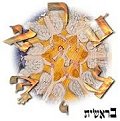
[ The following entry is related to this week's Torah reading (Bereshit). Please first read the Torah portion to "find your place" here. ]
10.16.09 (Tishri 28, 5770) For reasons not explained in Scripture, God chose to begin creating the world in chaos: תהוּ וָבהוּ וְחשֶׁךְ / tohu vavohu v'choshekh: "confusion and emptiness and darkness" (Gen. 1:2). From chaos and darkness God would shine forth light - indeed, the divine light was the first of all God's creations (a counterpart of the "Light of the World" Himself): יְהִי אוֹר וַיְהִי־אוֹר / yehi or, vayhi-or: "Let there be light, and there was light" (Gen. 1:3). God's handiwork in creation, then, first involves His mastery over chaos...
God speaks from the midst of a whirlwind (סְעָרָה, "tempest"), demonstrating that He is LORD over the seemingly chaotic world around us (Job 40:6). "Greek-minded" theology is more inclined to seek after "Apollo" (the pagan god of harmony and order) than the seemingly chaotic ways of the LORD God of Israel. We often want some sort of "systematic theology" and for God to be explained to us in an orderly, logical way. There is danger here that we forget that the LORD is called Esh Okhlah (אֵשׁ אכְלָה), a "consuming Fire" (Deut. 4:24, Heb. 12:29). God's thoughts are not our thoughts, neither are His ways our ways (Isa. 55:8-9). As the prophet Isaiah also said: יוֹצֵר אוֹר וּבוֹרֵא חשֶׁךְ עשֶׂה שָׁלוֹם וּבוֹרֵא רָע אֲנִי יְהוָה עשֶׂה כָל־אֵלֶּה / "I form the light, and create darkness: I make peace, and create evil: I the LORD do all these things" (Isa. 45:7).
We live in fearful times, chaverim. People are afraid of losing their jobs, of losing their health, of losing their freedoms, and so on. But we must be careful here. The fear of "losing control" can move us to anger, yet the sages liken anger to idolatry since it denies the providence of God in our lives (hashgacha pratit). Anger over the apparent chaos of life implies that we don't really believe that God is in control -- that He is speaking "from the midst of the whirlwind" -- and therefore we feel aggrieved and perhaps embittered by what might happen to us. We must look to God as the Master of the storms of life and draw closer to Him in trust. The Scriptures affirm that for those who love God "all things work together for good" - gam zu l'tovah - even if the present hour seems chaotic and even dangerous (Rom. 8:28-39).
Yeshua warned us not to live in fear of man, but rather to live in fear of God (Matt. 10:28). The worst that man can do is "kill the body" but he has no real power over the soul... Tribulation - the "squeezing of grapes" - is part of the life of faith, but we are invited to come "boldly" before the Throne of Grace (παρρησίας τῷ θρόνῳ τῆς χάριτος) to find help for our lives (Heb. 4:16). Note that the word translated "boldly" in this verse (παρρησίας) means that we can speak freely to God from the center of the chaos of our hearts -- without fear or shame. We don't need to conceal ourselves from the Divine Light, since this is the very Light that overmasters the chaos of creation! Those who accept that God is in complete control of their lives are set free from the terrible burdens of fear and anger. Abiding in ahavah shlemah (אַהֲבָה שְׁלֵמָה, God's "perfect love") means that you can let go.
May it please God to help us all remember: חֶרְדַּת אָדָם יִתֵּן מוֹקֵשׁ וּבוֹטֵחַ בַּיהוה יְשֻׂגָּב / "The fear of man lays a snare, but whoever trusts in the LORD is safe" (Prov. 29:25). May the LORD help us abide in His perfect love, free from the ravages of fear and anxiety. Shabbat Shalom chaverim!
 |
Vanity and Creation - הֶבֶל כָּל־אָדָם

[ The following entry is related to this week's Torah reading (Bereshit). Please first read the Torah portion to "find your place" here. ]
10.15.09 (Tishri 27, 5770) This week's Torah describes some of the dire consequences of the "Fall of Man," as Adam and Eve (Chavah) are banished from the garden, and the very first family of the earth is shown to be tragically dysfunctional. In a fit of jealous rage, Adam's firstborn son Kayin (Cain) murders his younger brother Hevel (Abel) and becomes an alienated vagabond, banished from his family. God then gave mankind ten generations to return to Him but nothing inherently changed. Finally "the LORD saw how great was man's wickedness on earth, and how every thought devised within his heart was nothing but evil every day. And the LORD regretted that He had made man on earth, and His heart was saddened. And the LORD said, I will destroy man whom I have created from the face of the earth" (Gen. 6:5-7).
The Talmud states that even after the great Flood (הַמַּבּוּל) humanity refused to truly turn back to God (as the present state of this world also attests). In light of the ongoing wickedness of mankind, the early sages Hillel and Shammai engaged in a protracted machlochet l'shamayim ("a debate for the sake of heaven") regarding whether it would have been better for humans not to have been created at all... Hillel argued that it was better that humans had been created, whereas Shammai argued the other way. Finally a vote was called for and the decision rendered was this: It would have been better for humans not to have been created than to have been created. However, since we do in fact exist, we must search our past deeds and carefully examine what we are about to do (Eruvin 13b).
The debate between Hillel and Shammai is not trivial, nor should it be dismissed out of hand. King Solomon was described as the wisest man on earth and yet he said, הֲבֵל הֲבָלִים הַכּל הָבֶל / havel havelim, hakol havelim ("Vanity of vanities, all is vanity," Eccl. 1:2). But is life really vain? Is it truly empty of lasting meaning? Is it, as Shakespeare once said, a "tale told by an idiot, full of sound and fury, signifying nothing"? It is noteworthy that Adam's second-born son was named Hevel (הֶבֶל), a word meaning "vapor" or "vanity." Perhaps his name was prophetic of his premature death at the hands of his brother Cain, though since Hevel was righteous (Matt. 23:35), it might be better to associate his "vanity" relative to the first family's debased values. Perhaps Hevel's name was given in despair, after all. Can we even begin to imagine the loss of the original paradise? Can we fathom the horror of losing direct fellowship with God? From the perspective of despair Hevel's life could indeed be regarded as vain, though, as Solomon later attests, the ultimate point of life is to fear God and keep His commandments: כִּי־זֶה כָּל־הָאָדָם / "for this is the whole of man" (Eccl. 12:13). Hevel was regarded as "vanity" in the eyes of man, but his death gave witness to the true worth of life. He was the very first martyr, and the "voice of his blood" called out for divine justice. The voice of the sacrificial blood of Yeshua, however, speaks of "better things" than the justice of God since it imparts mercy on behalf of the sinner... Our hands are collectively stained with the blood of Hevel, but the blood of Yeshua washes us clean (Heb. 12:24). The blood of Yeshua is what gives voice to the love and forgiveness of God...
Of course, Christianity agrees with the School of Hillel regarding the question of whether life is worth living. For example the Westminster Catechism states, "Man's chief end is to glorify God and to enjoy him forever" (an end, it may be said, that is also man's chief good). Christianity is not a life-denying faith, though it soberly acknowledges that olam hazeh - this world - is very often a vale of tears and a place of testing. Suffering and affliction in this present age are eschatologically justified as the means of apprehending a greater good. "For our light momentary affliction (θλῖψις: oppression, "squeezing" (as of grapes), "tsuris") prepares us for an eternal weight of glory beyond all comparison" (2 Cor. 4:17). This world is not our home, and we are afflicted with hardship while we sojourn in our exile. Our hearts "groan" (or "sigh," στενάζομεν) to be in heaven with the LORD, though our present state of suffering should be regarded as a temporary and "light" burden that will be fully comforted in the promised world to come.
Vanity has an end, chaverim, and this end affects the entire universe. The prophetic future holds hope that salvation will be literally cosmic in its sweep: "For the creation was subjected to vanity (לַהֶבֶל) not willingly, but because of Him who subjected it, in hope that the creation itself will be set free from its bondage to corruption and obtain the freedom of the glory of the children of God" (Rom. 8:20-21). May that day soon come for us, friends! יְהִי שֵׁם יְהוָה מְברָךְ - yehi Shem Adonai mevorakh: "Blessed be the Name of the Lord."
 |
Fences and Distance...
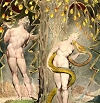
[ The following entry is related to this week's Torah reading (Bereshit). Please first read the Torah portion to "find your place" here. ]
10.15.09 (Tishri 27, 5770) Recall that when Chavah ("Eve") was tested by the nachash (נָחָשׁ, i.e., the "snake") in the Garden, she replied to his question about eating from the trees by misquoting God: "You shall not eat of the fruit of the tree that is in the midst of the garden, neither shall you touch it, lest you die" (Gen. 3:3). According to midrash, the source for this misquotation came from Adam, who had explained to Chavah that it was forbidden to even touch the "Tree of Knowledge of good and evil" (עֵץ הַדַּעַת טוֹב וָרָע). Now while his intention might have been good, Adam's decision to build a "fence around the Torah" (siyag la-Torah) proved to be disastrous. The midrash goes on to say that during the snake's confrontation with Chavah, he actually pushed her against the forbidden tree and said, "See, you did not die by touching it, and neither will you die from eating it." Chavah then began to doubt everything else Adam had told her - and this led to her eventual decision to eat the forbidden fruit.
The Torah later adds, "Never add anything to what I command you, or take anything away from it. Then you will be able to obey the commands of the LORD your God that I give you" (Deut. 4:2). Trying to "help" God get His message across can be a dangerous venture, chaverim. We can (and should) admonish and exhort one another, but we must be careful not to "read into" the texts of Scriptures ideas that just are not there. As Tozer once said, "The Scriptures, to be understood, must be read with the same spirit that inspired them." Adam's first mistake, then, was to distance his heart from God. This distance was then communicated to his wife, who expressed the rift in her actions. A similar sort of "distancing" from the intent of God's direction was also condemned by Yeshua who berated the Pharisees for adhering to traditions that confused the weightier matters of the will of God with the trivial (Matt. 23:23). Sadly, this idea of putting a fence around the Torah (i.e., siyag La'Torah (from siyag, סְיַג, a "fence") has led to traditions within Judaism that are sometimes at variance with the plain teaching of the Torah itself.
May God help us read His word with the same spirit that inspired them, chaverim.
The New Moon of Cheshvan

10.12.09 (Tishri 24, 5770) As I mentioned recently, this coming Shabbat immediately precedes the new moon (of Cheshvan) and is therefore called Shabbat Machar Chodesh (שַׁבָּת מָחָר חדֶש, "Shabbat of tomorrow's moon"). The Moon (יָרֵחַ), one of the lesser lights that God ordained for observing seasons and days (Gen. 1:14-16), is a symbol of both the transience of life and also the constancy of God... Every month the Moon begins in darkness, waxes full, and then wanes back to darkness until it is "reborn" at Rosh Chodesh. The cycle of near-disappearance and reappearance of the Moon on a monthly basis is thought by the sages to be symbolic of the faithfulness of God to Israel. Even when times appear dark, the God of Israel is present and will bring His Light from the seemingly hidden power of the Sun (שֶׁמֶשׁ).
 |
The cycle of the Moon is also a reminder of the distinction between appearance and reality, between what is seen and what is real... The Moon appears at once transient yet abiding, fleeting yet permanently fixed in place. It is an object lesson between the temporal and the eternal. The Moon gives off no light of its own but depends on the power of the Sun for its illumination. Indeed, the Moon teaches us to "look not to the things that are seen but to the things that are unseen, for the things that are seen are transient, but the things that are unseen are eternal" - τὰ γὰρ βλεπόμενα πρόσκαιρα· τὰ δὲ μὴ βλεπόμενα αἰώνια (2 Cor. 4:18).
It is customary to ask God to help us for the coming new month. The traditional prayer reads: חַדֵּשׁ עָלֵינוּ אֶת הַחדֶשׁ הַזֶּה לְטוֹבָה וְלִבְרָכָה לְשָׂשׂוֹן וּלְשִׂמְחָה / chadesh alenu et ha-chodesh hazeh l'tovah v'livracha l'sason ul'simcha: "Renew for us this month for good and for blessing, for happiness and joy." May the LORD God of Israel help you and bless you in this coming month, chaverim!
 |
Creation and the Kingdom of Love

[ The following entry is related to this week's Torah reading (Bereshit). Please first read the Torah portion to "find your place" here. ]
10.13.09 (Tishri 25, 5770) The Torah begins with בְּרֵאשִׁית בָּרָא אֱלהִים / Bereshit bara Elohim: "In the beginning God created..." (Gen. 1:1). Some of the sages say that this means, first of all, that God created the concept of time. Instead of תהוּ וָבהוּ וְחשֶׁךְ / tohu vavohu v'choshekh: "confusion and emptiness and darkness" (Gen. 1:2), the Spirit of God (רוּחַ אֱלהִים) "hovered" (like a circling dove) over the surface of the "waters of chaos" to bring order and perfection to the universe. The commentator Rashi notes that the word bereshit ("in the beginning") does not mean a chronological beginning, since the Torah then would have used the word בְּרִאשׁוֹנָה ("at first"). Instead, the word is based on the term rosh (ראשׁ, "head"), and therefore suggests what is most important, i.e., "at the head of (all things)," etc. Time is understood as a continuous cycle without historically identified beginning or end. Indeed, time itself is a "creature" that serves God's purposes...
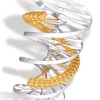
In light of this, Rashi wonders why the Torah, which (to his thinking) is essentially a book of commandments, did not begin with the first commandment given to the people of Israel, namely the commandment to "observe" the new moon of spring (Exod. 12:2). He then draws the connection between identifying the appointed times and seasons (מוֹעֲדִים) with the rule of God over creation itself (Gen. 1:14). To fulfill the commandment to observe the new moon (and therefore the rest of the days of the year), we must first of all understand that God is the Creator of time and the One who defines the seasons of our lives... Sanctifying time is a means of expressing God's Kingship.
Before going further with all this, I think it's important to keep in mind that the New Testament identifies Yeshua as Elohim (אֱלהִים) -- the very Creator of the cosmos: בְּרֵאשִׁית הָיָה הַדָּבָר / "in the beginning was the Word" (John 1:1,14). The Divine Voice cannot be separated from God, no more than the Spirit of God can be so separated. Yeshua is the Source of all life in the universe: כָּל־הַמַּעֲשִׂים נִהְיוּ עַל־יָדוֹ / "All things were made by Him (John 1:3). The "Word made flesh" is the "image of the invisible God" and the "radiance of the glory of God and the exact imprint (χαρακτήρ, 'character') of his nature" (Col. 1:15). All of creation is being constantly upheld by the word of His power (Heb. 1:3): "All things were created by Him (i.e., Yeshua), and for Him" and in Him all things consist (συνεστηκεν, lit. "stick together") (Col. 1:16-17). Creation begins and ends with the redemptive love of God as manifested in the Person of Yeshua our Mashiach... He is the Center of Creation - it's beginning and end. As it is written: אָנכִי אָלֶף וְתָו רִאשׁוֹן וְאַחֲרוֹן ראשׁ וָסוֹף / "I am the 'A' and the 'Z,' the First and the Last, the Beginning and the End" (Rev. 22:13). Indeed, Yeshua is מֶלֶךְ מַלְכֵי הַמְּלָכִים / Melech Malchei Hamelachim: The "King of kings of kings." He is LORD of all possible worlds -- from the highest celestial glory to the dust of death upon a cross... יְהִי שֵׁם יהוה מְברָךְ / yehi shem Adonai mevorakh: "Let the Name of the LORD be blessed" forever and ever (Psalm 113:2).
(Note that accepting Yeshua as none other than YHVH "come in the flesh" is regarded as the "Absolute Paradox" by Kierkegaard. The idea of the incarnation defies rational expressions of humanistically devised religion. The New Testament's view of the Godhead transcends simplistic rational monism by revealing that love - i.e., community - is the essence of ultimate reality itself. The idea of the "triunity" of God does not impugn the Oneness of God, but it transcends rabbinical Judaism and Islam's idea of "absolute monism" by understanding oneness in reference to an eternality of intrapersonal community. In other words, Ultimate Reality is multidimensional, personal and loving, and that is part of the very essence of God. There is no such thing as a "Person" - either human or Divine - that exists in an absolute vacuum, outside of relationship. Aristotle's "Unmoved Mover" is a solipsistic illusion and logical absurdity.... Still, all this is not to suggest that the Godhead is comprehensible. Faith in Yeshua as YHVH means accepting the intersection of finitude and space/time with infinitude and eternality. It is ultimately a confession of paradox and therefore of our limited understanding of the nature of God. However, such is not without real hope in a divine love that is so great that it would divest itself of regal glory to condescend to the dust of death itself. Confessing Yeshua as LORD is to affirm that God is God of all possible worlds and circumstances. One day every knee shall bow to to Him, just as it is written in Isaiah 45:22-23 and reaffirmed in Phil. 2:10-11.)
Now that we've reminded ourselves that the Scriptures teach that Yeshua is the very Creator and Voice of the utterances of God, we can procede... The Torah records that God (אֱלהִים) began creating the heavens and the earth in the darkness of the primordial yom rishon (יום ראשון, derived from ראשׁ), the "first day" (conventionally called "Sunday" in our modern calendars). The Biblical day (יוֹם) begins in the evening: "and there was evening and there was morning, the first day." This was the "chaotic stage" of creation. From darkness would shine forth light - indeed, the divine light was the first of all God's creations (a counterpart of the "Light of the World" Himself): יְהִי אוֹר וַיְהִי־אוֹר / yehi or, vayhi-or: "Let there be light, and there was light" (Gen. 1:3). This pattern, vayhi erev, vayhi voker (וַיְהִי־עֶרֶב וַיְהִי־בקֶר), "and there was evening and there was morning," recurs for each of the six days of creation, including the sixth day, when God created man on the first Erev Shabbat. Because of this, all Jewish holidays begin at night (and also because of this, Christians understand yom rishon to be a picture of both the resurrection of Yeshua and the recreated heavens and new earth).
According to Jewish tradition, this first Erev Shabbat was also Rosh Hashanah, the "head of the year." Rosh Hashanah therefore represents the day that God began to rule as King of the Universe. When Adam first opened his eyes and human consciousness was born, he immediately understood that the LORD created all things, including himself. According to midrash, Adam's first words were, יהוה מֶלֶךְ עוֹלָם וָעֶד / Adonai malakh olam va'ed: "The LORD is King for ever and ever." God then said, "Now the whole world will know that I am King," and He was very pleased. This was the "tov me'od" (טוֹב מְאד) moment of creation, when God saw all that He had made "and found it very good" (Gen. 1:31). The birthday of humanity is therefore the Coronation Day for the King of the Universe. This also explains why each Shabbat we remember God as our creator. Indeed, among Orthodox Jews, Erev Shabbat is considered the "gateway" back to the Garden of Eden....
According to the sages, the goal or purpose of God's creative activity was the building of a kingdom based on divine love (מַלְכוּת הָאֱלהִים). As King David wrote, עוֹלָם חֶסֶד יִבָּנֶה / olam chesed yibaneh: "The world is built with chesed" (Psalm 89:3[h]). The world itself is to built upon the foundation of God's love (חֶסֶד, chesed) as it is expressed in the lives of the tzaddikim (the righteous). Indeed, the very first mitzvah (commandment) given to mankind was simply פְּרוּ וּרְבוּ / pru urvu: "be fruitful and multiply" (Gen. 1:28). The family, then, is a picture of a nurturing community based on chesed. For the Christian, this "family building" is centered on Yeshua the Messiah, the true King of the kingdom and the rosh pinnah (ראשׁ פִּנָּה), or "corner stone" of the Temple of God (see Heb. 3:1-6).
The first "lo tov" (לא־טוֹב / "it is not good") statement made by God concerned Adam's state of solitude in the garden. Adam needed a companion, an ezer kenegdo (עֵזֶר כְּנֶגְדּוֹ), a "helper opposite to him." The sages note that Chavah ("Eve") could either function as Adam's helper (ezer) or his opponent (mitnaged) depending on his merit. Note that Eve was not created to be in subservience to Adam. Indeed, Chavah was the "finishing touch" of Adam, a more refined and sensitive counterpart. Chavah would mirror back to Adam the middot (qualities) of himself... Indeed, in the "genealogy" of humanity, we see that Adam, the firstborn "son of God," comes from adamah (אֲדָמָה, "earth") whereas Chavah, whose name means "life," is related to the verb (חָוַה) that means to "declare" or reveal (Psalm 19:3). Chavah is called em kol-chai (אֵם כָּל־חַי), the mother of all living (Gen. 3:20), and as such, she also is a picture of God, the "feminine" aspect of God suggested by the divine Name, El Shaddai (shadayim means "breasts").
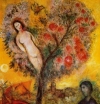
Why was Adam created on the sixth day, from the dust of the earth? Why wasn't he created yesh me'ayin ("ex nihilo") like the angels? The sages answer that this was intended to instill humility in all of us, since even a gnat has an earlier lineage than does the first man. And yet creation itself was designed to express the Kingship of God, and for that man was needed. Man is made from the lowliest substance of earth (dust is next to nothingness itself) and yet he is imparted with nishmat chaim (נִשְׁמַת חַיִּים), the "breath of souls." Mankind functions as a "bridge" between the material and spiritual worlds, and through mankind creation itself is sanctified.
In a discussion regarding capital punishment, the Talmud states: "If someone strikes many coins from one mold, they all resemble one another, but the King of Kings, the Holy One, Blessed be He, made each man in the image of Adam, and yet not one of them resembles his fellow. Therefore every single person is obligated to say, bishvili nivra ha'olam (בִּשְׁבִילִי נִבְרָא הָעוֹלָם), "The world was created for my sake" (Mishnah Sanhedrin 4:5). This is why murdering another human being created b'tzelem Elohim (in the image of God) is considered so horrendous. The sages reasoned that whoever destroys a single soul is accounted as if he had destroyed the whole world; and whoever saves one soul is accounted as if he had saved the entire world. Hence the Torah (Gen. 4:10) records "The voice of the bloods of your brother cries out to me" (קוֹל דְּמֵי אָחִיךָ צעֲקִים אֵלַי). It was not merely the innocent blood of Hevel that cried out, but rather the blood of all his ancestors who were destroyed along with him.
On the other hand, each of us must remember (as did father Abraham) that we are afar ve'efer - "dust and ashes" (Gen. 18:27). While it is true that we are esteemed by God as His image bearers, our flesh (basar) comes from the dust of the ground. Even our beloved Lord Yeshua clothed Himself in such dust, demonstrating the ultimate form of humility and compassion for us (Phil. 2:7).
An old chassidic tale says that every person should walk through life with two notes, one in each pocket. On one note should be the words bishvili nivra ha'olam (בִּשְׁבִילִי נִבְרָא הָעוֹלָם) -- "For my sake was this world created," and on the other note the words, anokhi afar ve'efer (אָנכִי עָפָר וָאֵפֶר) -- "I am but dust and ashes."
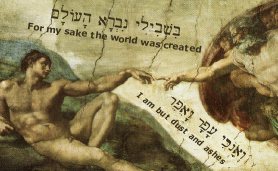 |
Values like love, beauty, and truth are not empirical concepts. We do not find them in a test tube or infer them from the facts of experience. On the contrary, we bring them to our experience as image bearers of God, attesting to the wonder of creation and our place within it. The human soul (נְשָׁמָה, neshamah) is not something that a physicist or behavioral psychologist can reduce to other terms, but is an irreducible part of our existence, just as our need for love is itself ineradicable. Human dignity and worth are therefore the result of the love of God as revealed in Yeshua our Messiah.
The goal or purpose of God's creative activity was the building of a kingdom based on divine love (מַלְכוּת הָאֱלהִים). As King David wrote (and Yeshua likewise preached), עוֹלָם חֶסֶד יִבָּנֶה / olam chesed yibaneh: "The world is built with chesed" (Psalm 89:3[h]). The "corner stone" of the Temple of God (i.e., rosh pinnah, ראשׁ פִּנָּה) is the love and kindness of the King of king of kings, Yeshua the Creator, of whom it is written: "Worthy are you, our Lord and God, to receive glory and honor and power, for you created all things, and by your will they existed and were created" (Rev. 4:11).
Note: The foregoing just scratches the surface of a few key topics related to this week's Torah reading. Later I hope to discuss the fall of man, the serpent in the garden, and so on, as time permits. Shalom for now.
 |
The Talmud and Zohar on "Bereshit"

10.13.09 (Tishri 25, 5770) Two Jews, three opinions... It sometimes seems like Judaism quite literally can't figure out the first word of the Torah... Lest you think me unfair, consider the very first word of the Torah -- the Hebrew word bereshit (בְּרֵאשִׁית).
Regarding this word the Talmud states that King Ptolemy of Egypt gathered 72 sages and placed them in 72 chambers without telling them why he brought them together. The legend has it that he went to each sage and told him: "Translate for me the Torah of your master Moses into Greek." (This ancient Greek translation was later known as "translation of the Seventy" (i.e., תַּרְגּוּם הַשִּׁבְעִים) or the "Septuagint"). God then prompted each sage to translate the Torah in precisely the same way. For example, the sages all rendered bereshit bara Elohim in Greek as, "God created in the beginning" (ἐν ἀρχῇ ἐποίησεν ὁ θεὸς) instead of the more literal, "In the beginning created God." The Talmud claims that God prompted the sages to translate this way in order to prevent Ptolemy from thinking that God (אֱלהִים) was created by a spearate being named "in the beginning" (i.e., bereshit).
Now what is ironic about all this is that the Kabbalists do precisely what the Talmud claims was expressly forbidden. According to the Zohar, one of the names of God associated with the attribute of "Binah" (understanding) is Elohim (אֱלהִים), and therefore when the Torah says "bereshit bara Elohim," the word Elohim is really to be understood as a direct object, not as the subject of the verb. Moreover, since the word reshit (רֵאשִׁית) is associated with wisdom (חָכְמָה) in Psalm 111:10, the word "bereshit" should be read as "with wisdom." Thus the Kabbalists maintain that "In the beginning God created..." should be translated as "with wisdom Ein Sof (the unexpressed subject of the verb) created Elohim. Here is a diagram of the first clause of the verse:
 |
It should be clear that the Zohar's approach is a classic example of "reading into" the text ideas that simply are not present. Indeed, relying on esoteric methods to discover the hidden meaning of Torah invariably yields confusion and error, chaverim. At any rate, as the word bereshit indicates, there is a great divergence of opinion among Jews regarding its meaning. And since normative Judaism claims that the Oral Torah is a source for genuine truth, those who follow mystical traditions within Judaism will find themselves at odds with the history of Jewish theology.
Parashat Bereshit - בראשית

10.12.09 (Tishri 24, 5770) During Simchat Torah ("Joy of the Torah") we read the last portion of the Torah (Vezot Haberakhah) as well as the first part of the first portion (Bereshit) to symbolize that Talmud Torah - the study of Torah - never ends. This Shabbat, however, the full portion of Parashat Bereshit will be recited at synagogues all over the world....
Note: The word bereshit (בְּרֵאשִׁית) can mean "in the beginning" or "at the start" or "at the head of (all things)," etc. Notice the term rosh (ראשׁ, "head") appears embedded in the word as its shoresh (root). In Jewish tradition, the word can refer to either the first weekly Torah portion (parashah) in the annual Jewish cycle of Torah reading (called "parashat Bereshit") or to the first book of the Torah itself (called "Sefer Bereshit"). When used to refer to the first book of the Torah, bereshit is sometimes called sefer rishon (the First Book) or sefer beri'at ha'olam (the Book of the Creation of the world). The ancient Greek translation of the Torah (i.e., the Septuagint) called the book "Genesis" (Γένεσις: "birth", "origin") instead of using the translation of the first Hebrew word (בְּרֵאשִׁית), i.e., ἐν ἀρχῇ, for the book's title. The term "Genesis" was used in subsequent Latin and English translations of the book. There are fifty chapters in Bereshit (20,512 words, 78,064 letters) that are divided into twelve weekly readings.
Creation - Past Tense or Present Tense?
Sometimes we are tempted to think of Creation as something "past tense." God created everything and then "stood back" to watch the drama of cosmic history unfold... This is an incorrect way of thinking about creation, however, since God not only created the universe but is also continually creating it yesh me'ayin - out of nothing (Heb. 1:3). And since parashat Bereshit is centered on creation, it is therefore centered on Yeshua Himself, of whom it is written: "all things were created by him, and for him" and in Him all things consist (συνεστηκεν, lit. "stick together") (Col. 1:16-17). Creation begins and ends with the redemptive love of God as manifested in the Person of Yeshua our Mashiach....
"God creates out of nothing, wonderful, you say: yes, to be sure, but he does what is still more wonderful: he makes saints out of sinners." -- The Journals of Søren Kierkegaard: A Selection, no. 209, 1838 entry
The Hakafah of Torah
So "round and round and round" the year we go... This week we begin reading the Torah again -- right from the beginning -- but this time we'll read for the new Jewish year of 5770! May the God of Israel grant you hatzlachah (הַצְלָחָה, "success") as you endeavor to honor Him through talmud Torah, chaverim (2 Tim. 2:15, 3:16).
Since we are at the very beginning, let's look at the very first word of the entire Torah, the Hebrew word Bereshit (בראשׁית). These six letters are sometimes compared to the six days of creation. The first and last two letters form the word brit (covenant) while the remaining inner letters form the word esh (fire), suggesting that the act of creation itself is a "Covenant of Fire." Here's a simple diagram to show the relationship:

Words created the universe -- or rather, the Word of God did (בְּרֵאשִׁית הָיָה הַדָּבָר). When the Divine Voice (i.e., the Word of God) spoke cosmic Light into existence (Gen. 1:3), God was not creating the physical light of the Sun or the Moon, since the heavenly bodies were created later (Gen. 1:14). This supernal light was the first expression of God's handiwork outside of Himself, His first revelation of contingent existence (i.e., existence that owes its source, continuance, and end to God's transcendent power and will). The Divine Light forms the canvass, if you will, of God's portraiture of creation (in three-dimensional terms, the Divine Light forms a sort of "container" that becomes the "house" of Creation). Among other things, this means that ultimate reality is grounded in the Source of Light, Love, and Truth -- regardless of how dark the present hour may appear. (click to continue...)
Speaking of the darkness, this coming Shabbat immediately precedes the new moon (of Cheshvan) and is therefore called Shabbat Machar Chodesh (שַׁבָּת מָחָר חדֶש, "Shabbat of tomorrow's moon"). Because of this, Jewish tradition assigns a different Haftarah reading (1 Sam. 20:18-42) in place of the reading from the prophet Isaiah.

If it pleases God, I will add additional commentary to this critical portion of Torah later this week, chaverim. Meanwhile, may the LORD grant you "joy unspeakable" and the comfort of glorious His presence...
New Perfumes of the Torah

10.10.09 (Tishri 22, 5770) I am now offering two different perfumes that were developed in Israel: frankincense (levona) and myrrh. Frankincense was lavishly used in Temple worship (the Torah specifies it as an ingredient for incense (Exod. 30:34)) and myrrh was used as an essential constituent of ancient perfumes and incense. According to the Gospel of Matthew, gold, frankincense and myrrh were among the gifts presented to Yeshua by the Magi who came to honor the one born the King of the Jews. These make great gift ideas for someone you love... For more information, see this page.
Celebrate the Living Torah!

10.09.09 (Tishri 21, 5770) The climax of the festival of Sukkot is called Simchat Torah ("Joy of Torah"). On Simchat Torah we conclude, and begin anew, the annual Torah-reading cycle. First we read the Torah section of V'zot Haberakhah, and then we read the first chapter of Genesis (the beginning of the next Shabbat's Torah reading). Many Simchat Torah services are rather boisterous events that include "hakafot" - i.e., dancing around the Torah scrolls in delirious praise and thanks....
Since Yeshua the Mashiach (Jesus Christ) is Torah Ha-Emet - the True Torah - we should likewise celebrate the Joy of Torah in our lives. Yeshua is the Living Torah, the Living Word, written upon our hearts so that we can truly dance and embrace the Truth given from God. Indeed, Yeshua did not come to destroy the Torah but rather to fulfill it in our lives (Matt. 5:17-20). As it is written in the Tanakh regarding the New Covenant:
"Behold, the days come, saith the LORD, that I will make a new covenant (B'rit Chadashah) with the house of Israel, and with the house of Judah: Not according to the covenant that I made with their fathers in the day that I took them by the hand to bring them out of the land of Egypt; which my covenant they brake, although I was an husband unto them, saith the LORD: But this shall be the covenant that I will make with the house of Israel; After those days, saith the LORD, I will put my law (Torah) in their inward parts, and write it (the Torah) in their hearts; and will be their God, and they shall be my people. And no longer shall each one teach his neighbor and each his brother, saying, 'Know the LORD,' for they shall all know me, from the least of them to the greatest, declares the LORD. For I will forgive their iniquity, and I will remember their sin no more." - Jeremiah 31:31-34
This very idea is clearly re-affirmed in the New Testament (see Heb. 8:8-11). As Christians, then, we have the greater reason to celebrate Torah, since Yeshua (Jesus) is of course the Central Message of the Torah -- its inner meaning and incarnation.
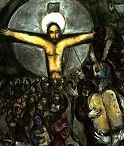
Yeshua is the Torah made flesh (John 1:14), the faithful Mediator of the New and Better Covenant (Heb. 8:6), and He does what Moses and the Sinatic covenant could never do, namely, write the Torah within our inward parts and upon our hearts so that we might truly be the people of God (Jer. 31:31-34). Though His was the Voice that spoke the law to Moses, by means of His sacrificial death Yeshua graciously fulfills the righteous demands of Torah on our behalf, and the LORD is glorified as both just and merciful (i.e., the justifier of those who put their trust in Him). By means of His sacrificial suffering, we are now enabled to truly dance!
The Torah (i.e., law) is holy, just and good (Rom. 7:12), but those seeking righteousness based on it's demands will discover the tragic fact that it is powerless to impart righteousness and life (2 Cor. 3:7-18). It is sin within the human heart that condemns people - not the Torah. The crucifixion of Yeshua condemned sin in the flesh (again, it did not condemn the Torah) and now the righteousness of God is imparted to those who embrace Yeshua by faith (Rom. 8:3-4). Enabled by the Holy Spirit, with the Torah now written upon our hearts (Jer. 31:31-3; Heb. 8:10-11), we are empowered to fulfill the requirements of the law based on a new covenant relationship with God (Gal. 2:16, 3:2). We no longer seek righteousness by means of maintaining ritualistic or other ordinances (Rom. 4:5, Gal. 2:16) but by receiving the free gift of Mashiach's righteousness imputed to us through our trust (Eph. 2:8-9). Because of Yeshua's victory, we do not strive for acceptance before the Father, we abide within it, chaverim…
Shabbat Shalom chaverim v'chag sameach. How good is God to give us the precious gift of His Word! Torah joy is our song tonight!
 |
Chazak! Chazak!
10.09.09 (Tishri 21, 5770) If you have been regularly reading and studying Torah with me, rejoice that we have completed the last book of Torah (Devarim) and are now begining anew with Bereshit (Genesis).

During the concluding pasuk of each book of the Torah it is customary for the congregation to stand as the Torah reader reads the final words. Then, in a dramatic manner, he signals to the congregation, who then respond with "Chazak, chazak, ve-nit chazek" (Be strong, be strong, and let us be strengthened!):

This is a cry of encouragement to continue with the reading of the next book, and to return to this one again in due course. This custom may be derived from the words of Joshua to the children of Israel, "chazak ve'ematz" (be strong and courageous).
The Hebrew greeting Yasher Koach! means "May your strength be firm," and is often said to those who have had performed Torah reading aliyah at synagogue.
Note that the Hebrew Scriptures begin -- not from the first person perspective of some man's understanding of God -- but from an omniscient third person perspective, a Voice that reveals the Glorious Power that created the entire cosmos by means of His Word. The very first verse of the Bible, then, reveals the triune nature of God, further indicated by the use of the plural form of the name Elohim with the singular verb bara (he created). Indeed, in this very first parashah we a read a direct quotation from this Elohim that uses plural personal pronouns: "Let us make man in our image and in our likeness." Ultimate reality therefore is not some sort of monism wherein God is seen as an abstract monolithic Power that created all things (like an Unmoved Mover), but is echad (one) in a sense that is inherently relational, personal, and the expression of everlasting love.
 |
Hashana Rabbah
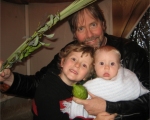
10.08.09 (Tishri 20, 5770) Tonight begins Hoshana Rabba (הוֹשַׁנָא רַבָּה) - the final day of Sukkot - and a sort of "last chance at teshuvah." (Outside of Israel, we eat in the sukkah an additional day, called Shemini Atzeret.) Among Orthodox Jews it's customary to stay up all night studying Torah and to greet friends with the phrase, "piska tava," meaning (in Aramaic) "a good note" (i.e., referring to the judgment of Yom Kippur). During the morning prayer service of Hoshana Rabbah, many Jews choose to wear a kittel (also like on Yom Kippur). Please remember to pray for the Jewish people, chaverim...
The One Who Calls us Near
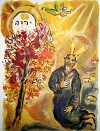
10.08.09 (Tishri 20, 5770) In this present world (olam hazeh) there are often difficult situations and painful experiences that test even the most resolute faith. Indeed life here is called nisayon - a test. Each of us is under divine examination regarding what we ultimately worship (i.e., regarding that which we will find "worth").
Some things simply cannot be seen apart from the eye of faith in the good. It's been said that "the optimist believes that this is the best of all possible worlds; the pessimist is afraid the optimist is right." But note that both the optimist and the pessimist are believers -- the one keeps hope while the other caves into despair. Pessimism is a dis-ease of the spirit, after all - an abandonment of hope in the good. Faith sees "beauty in ashes" that cannot be apprehended apart from real hope (Rom. 8:24).
The heart of emunah (faith) ultimately affirms: gam zu l'tovah (גַּם זוּ לְטוֹבָה), "this too is for the best" (cp. Rom. 8:28). Emunah "sees what is invisible" (2 Cor. 4:18) and understands (i.e., accepts) that the "present form of this world is passing away" (1 Cor. 7:31). It affirms that underlying the surface appearance of life (chayei sha'ah) is a deeper reality (chayei olam) that is ultimately real and abiding. Emunah therefore understands suffering as part of the greater purposes of God in the world. Everything has a reason, and that includes the seemingly trivial as well as the obviously tragic. The life of emunah calls us to live as toshavim (תוֹשָׁבִים) - sojourners - who are put at a "distance" from the world of appearances. Faith leads to a form of divine "homesickness," a cry of protest over the state of this world and its evils, and a gnawing hunger for love and truth to prevail in the world. By itself, emunah would die of intolerable heartache were it not for the gift of God's comfort. Indeed, the Scriptures describe God as Av Ha-Rachamim (the Father of mercies) and the God of all comfort:
בָּרוּךְ הוּא הָאֱלהִים אֲבִי אֲדנֵינוּ יֵשׁוּעַ הַמָּשִׁיחַ
אֲבִי הָרַחֲמִים וֵאלהֵי כָל־נֶחָמָה
Barukh hu ha'Elohim Avi Adoneinu Yeshua ha'mashiach,
Avi ha'rachamim ve'lohei khol-nechamah
"Blessed be the God and Father of our Lord Yeshua the Mashiach,
the Father of mercies and God of all comfort" (2 Cor. 1:3)
(Download Study Card)
The blessing continues: "who comforts us in all our affliction, so that we may be able to comfort those who are in any affliction, with the comfort with which we ourselves are comforted by God" (2 Cor. 1:4). Note that Paul links our present suffering (πάθος, pathos) with a divinely imparted comfort (παράκλησις, "paraklesis"), which he regards as a state of blessedness. God Himself "calls us to His side" (from παρά + καλέω) in the midst of our afflictions and pain.... The Greek text reads, ὁ παρακαλῶν ἡμᾶς ἐπὶ πάσῃ τῇ θλίψει ἡμῶν, and might be better rendered as, "The one calling to us [to His side] in all our tribulations" (2 Cor. 1:4). God doesn't want us to go through tzuris by ourselves, all alone. He invites us to come to His side for comfort...
The purpose of our afflictions is to learn to let go of what we value in the world in order to attain to a better hope. טוֹב־לִי כִי־עֻנֵּיתִי לְמַעַן אֶלְמַד חֻקֶּיךָ / "It was good for me that I was afflicted, that I might learn your statutes" (Psalm 119:71). God calls out to us in our tribulations so that we may turn away from our illusions and seek refuge in His Presence. Suffering is a tool that only God has the wisdom to use as a means of blessing in our lives. As A.W Tozer once wrote, "It is doubtful whether God can bless a man greatly until He's hurt him deeply," and as Charles Spurgeon likewise affirmed:
Trials make more room for consolation. There is nothing that makes a man have a big heart like a great trial. I always find that little, miserable people, whose hearts are about the size of a grain of mustard-seed, never have had much to try them. I have found that those people who have no sympathy for their fellows -- who never weep for the sorrows of others -- very seldom have had any woes of their own. Great hearts can only be made by great troubles. The spade of trouble digs the reservoir of comfort deeper, and makes more room for consolation. God comes into our heart -- He finds it full -- He begins to break our comforts and to make it empty; then there is more room for grace. The humbler a man lies, the more comfort he will always have. (Spurgeon, Consolation Proportionate to Spiritual Sufferings, 1855).
Note that the heart of emunah is not required to say, gam zu tova - "This is the best," but rather gam zu l'tova - "This, too, is for the best." Having faith that God will one day "wipe away every tear" does not deny the existence of real tears being shed, but it does affirm that real (existential) comfort is coming, and that sadness, pain, and suffering will not be given the last word..... There is an eschatological aspect to suffering for the person of faith. Present suffering will ultimately be redeemed as soul-building, but this does not entail "karma-like" indifference regarding suffering we encounter... If one of us hurts, so does the rest of the body (1 Cor. 12:26). This isn't sanctimonious humbug; there's no "double talk" going on here. The most succinct verse in the New Testament on this subject is but two words: "Jesus wept" (John 11:35). Nonetheless, we can find great comfort by heeding the voice of pain as a diguised message from God. God calls to us in all our tribulations so that we might make our refuge in Him.
May you find His comfort in His Presence now, chaverim.
 |
Yom Holedet Sameach to Josiah!

10.07.09 (Tishri 19, 5770) Those of you who've been longtime visitors to this site might recall the birth of our first son, Josiah Yisroel, back in October of 2004. Well, today is his fifth birthday! Hooray!
Josiah is such a joy and a light to us. If you knew him you would love him, chaverim. His heart is gentle and full of kindness and good will toward everyone... Please offer up a prayer for him, dear friends. May it please God to bless him and help him in every way...
Yom Holedet Sameach, Yoshiyahu!

Blessing others in love...

10.07.09 (Tishri 19, 5770) In Jewish tradition it is customary for a kohen (priest) to inwardly recite a preparatory blessing before performing birkat kohanim ("the priestly blessing" as prescribed by the Torah). This "preparatory blessing" goes as follows:
Baruch attah Adonai, Elohenu melech ha'olam,
asher kideshanu bikdushato shel Aharon,
v'tzivanu l'varekh et am Yisrael b'ahavah.
"Blessed are You, LORD our God, King of the universe,
Who makes us holy with the holiness of Aaron,
and has commanded us to bless His people Israel with love."
The phrase "with love" is integral and is intended to represent the love of the LORD for His people. Just as God blesses us as an expression of His kindness, so too the kohen must seek to display God's love in this manner. The preparatory blessing is intended to induce a state of kavanah (focus) of heart before offering up the blessing.
According to the sages, the obligation to bless the people "with love" comes from the Scriptures themselves. The verse that immediately precedes the commandment to bless the people says, "Thus you shall bless the people of Israel: you shall say to them..." The word "say" here is amor, and is written with an "extra Vav," i.e., אָמוֹר. This "full spelling" of the verb is said to indicate that the act of blessing others should not be done in a halfhearted or impatient manner, but rather with fullness of heart and sincerity. The desire of the blesser to see others blessed is considered vital -- just as the desire of the hearer should be to sincerely receive the blessing itself. When the priest lifts his hands during the recitation ("May the LORD bless you and keep you..."), it is a virtual "semikhah" (ordination), something that the sages regard as integral to every blessing.

Followers of the Messiah Yeshua are likewise priests of the New Covenant (1 Pet. 2:5-9, Rev. 1:6). Like the kohanim of the older covenant, blessing others should be regarded as a "hands on" act of love... The inner intention of the heart must be moved in earnest compassion for the welfare of the beloved, and this means reaching out to others to lift them up. Indeed this image of "lifting up" is implied in the words of the priestly blessing itself. The phrase, "May the LORD lift up His face toward you..." - יִשָּׂא יְהוָה פָּנָיו אֵלֶיךָ - suggests a picture of God holding you up in His arms, as a delighted father might hold up his young child in joy.... God "lifts up His face" as He holds you up in divine joy!

Dwelling Without Fear...
10.06.09 (Tishri 18, 5770) It has been cold and rainy up here in Minnesota (currently it's just 45 degrees Fahrenheit). Nonetheless, we're trying to eat some meals out in the sukkah - despite the weather (and despite being sick). Here's a picture I took of Josiah waving the "four species" last night:
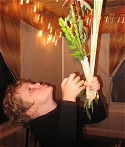
In Jewish tradition, after reciting the Hebrew blessing and shaking the lulav around, it is customary to recite (or sing) the following antiphon from Psalm 138:
הוֹדוּ לַיהוה כִּי־טוֹב כִּי לְעוֹלָם חַסְדּוֹ
hodu l'Adonai ki-tov, ki l'olam chasdo
"Give thanks to the LORD, for he is good, for his steadfast love endures forever."
Indeed, is there any better reason to give thanks to the LORD than because of His steadfast love, i.e., His chesed (חֶסֶד)? Is there anything greater than the astounding love of God? Can anything overcome it? Can even the hardness of your own heart somehow veto or negate it's purposes? It was because of His great love that God (יהוה) "emptied Himself" of heavenly glory, becoming clothed in human flesh and becoming disguised a lowly slave (δοῦλος). God performed this act of "infinite condescension" in order to "tabernacle" with us as our "hidden King" (John 1:1,14, Phil. 2:7-8). Your neshama (soul) is the "Shulamite woman" he came to woo so that you might "come into His tent" -- willingly, from the heart (Song of Solomon).
When we receive Yeshua (kabbalat Yeshua), we abide in the hope of a love that awaits consummation in the world to come... Meanwhile, we are "suspended between worlds," though the veil of this world has been rent asunder and we may now appear before the LORD in the realm of the spirit by faith. We can come "boldly" before the Throne of Grace (παρρησίας τῷ θρόνῳ τῆς χάριτος) to find help for our lives (Heb. 4:16). Note that the word translated "boldly" in this verse (παρρησίας) comes from πᾶς (all) + ῥέω (to utter), suggesting that we can speak freely to God entirely from the heart -- without fear or shame. We do not need to conceal ourselves from the Divine Light -- any more than we need to perform arabesque rituals or offer any "prescribed prayers" to access Him. We who are trusting in God's sheltering love understand the LORD to be our loving Savior and Redeemer. In our brokenness we can bare our souls before Him without fear ("there is no fear in love" - אין פַּחַד בָּאַהֲבָה). We can express "all our heart" to the LORD and be assured that He will help us in our hour of need (Heb. 4:16).
God loves the little children and never prevents them from coming to Him: "for to such belongs the kingdom of heaven" (Matt. 19:14, Mark 10:14). O praise and thank God for Jesus, chaverim! What we we do without Him?
Personal Update:
Like some of you, we've been feeling the stress lately... We are trying to buy health insurance for the family, but for some reason our medical center is not forwarding the records to our prospective carrier -- and time is running out before we will be without any coverage at all... We're also trying to keep our house by refinancing our mortgage based on my adjusted income (i.e., after my job loss), but we're facing a lot of obstacles and red-tape. All this on top of having to replace our refrigerator and dryer last month, and you can perhaps understand that we are stressed. Baby Judah also appears to have colic so it's been draining us to constantly hold him, etc. Olga is really at meltdown stage. Your prayers are appreciated: Thank you.
 |
I've been sick the last few days...

10.06.09 (Tishri 18, 5770) Shalom Chaverim. I have been sick since Yom Kippur and haven't had the energy to update the site the last few days. With God's help I will find healing and chazak. Thank you for your prayers.
New Hebrew Meditation
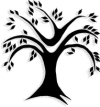
10.05.09 (Tishri 17, 5770) I wrote a new Hebrew meditation (Teshuvah of the Tongue) based on Psalm 19:14, "Let the words of my mouth and the meditation of my heart be acceptable to You, O LORD, my Rock and my Redeemer." I hope you will find helpful, chaverim.
Our Erev Sukkot Celebration
10.03.09 (Tishri 16, 5770) Last evening we celebrated the start of Sukkot at my in-laws home. They built a beautiful sukkah on their deck and we had a good time of fellowship. Though the weather was cold and rainy, we waved our lulavs, prayed, and ate within the sukkah. This was baby Judah's first Sukkot, and he seemed to really enjoy the festive atmosphere (his brother Josiah, of course, had great fun). Here are some pictures from the evening, chaverim:
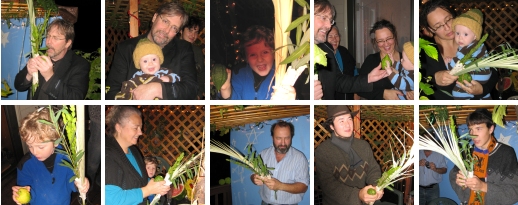 |
Shalom and blessings to you all in our Lord Yeshua the Messiah - the One who "tabernacles" with us and who graciously invites all to come within the shelter of His everlasting love. וַיְהִי בְשָׁלֵם סֻכּוֹ וּמְעוֹנָתוֹ בְצִיּוֹן / vayehi v'shalem sukko, u'me'onato v'Tzion: "His sukkah is in Shalem; His place in Zion" (Psalm 76:3). The world is indeed under divine judgment, but those who put their trust in the LORD can say along with King David: יִצְפְּנֵנִי בְּסֻכּה בְּיוֹם רָעָה / yitzpeneni b'sukkoh b'yom ra'ah, "He will conceal me in His sukkah in the day of trouble" (Psalm 27:5).
Sukkot Sameach!

10.02.09 (Tishri 14, 5770) "On the first day you shall take to yourselves the fruit of the goodly tree, branches of palm trees, boughs of leafy trees and willows of the brook, and you shall rejoice before the Lord your God seven days." (Lev. 23:40)
This afternoon we bought our "four species" (arba minim) -- i.e., an etrog (citron), a palm branch (lulav), two willow branches (aravot), and three myrtle branches (hadasim) and assembled them. First you take the bundle holder and insert the palm branch (lulav) into the center (tighten using the bundle bands as needed). Take the two willow branches (aravot) and insert them into the left chamber, and the three myrtle branches (hadasim) and insert them into the right chamber:
 |
The leafy plants are held in the right hand and the etrog ("the product of goodly trees") in the left (with the tip (pitam) facing downward). The usual practice is to recite the blessing (al netilat lulav) and then wave the lulav three times in six directions: forward, to the right, to the back, to the left, up, and down (to proclaim God's omnipresence). After reciting the blessing, you turn the etrog right-side up, with the pitam pointing upward.
Here are a couple pictures of our lulav and etrog for this year:

We wish a season of happiness and joy as you celebrate the sheltering presence of the LORD Yeshua in your life, chaverim... Shalom.
Prayer Request for this Ministry

10.01.09 (Tishri 13, 5770) I am weary, chaverim, and need some time to recharge and refocus. I sincerely ask for your prayers.... I need to hear from the LORD regarding His will for my life. Please help me by offering up a prayer on behalf of the future direction of this ministry. Thank you so much. - john
|
|



















































